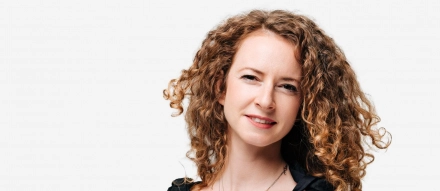
Mazars CEE Design Sprint
An interview with Yulia Zaprudska, HR CEE Coordinator
1. What does it mean for a professional to be a part of the Mazars team?
By joining Mazars, not only professionals but also beginners are starting an exciting journey. Apart from professional growth, the Mazars culture is designed to enable talents and provide a variety of opportunities for them to get involved and succeed on their paths. It encourages people to engage into learning, automation, sustainability, CSR projects and other key topics, to build a great community of like-minded people, and to unlock ideas by strengthening innovative thinking. We cultivate an entrepreneurial mindset, which allows every Mazarian to share their ideas and to participate in the development of local practices, aligning perfectly with our long-term strategy, which empowers employees to take ownership and contribute to the firm's growth.
2. How did Design Sprint become a part of the Mazars’ strategy?
The purpose of the Design Sprint project is to teach about the Design Thinking process, which helps our employees to efficiently go through ideas, discussions, solution testing, and final implementations of the best ideas.
Through teaching our Mazarians these new skills in every country of Central and Eastern Europe, we are aiming to create the context for the universal culture of innovative mindset to bloom, and as a result, it gives back every time more motivated teams, new developments, and interesting challenges to work on.
3. How did the project evolve within Mazars?
We started with a regional mindset, with small steps to help empower our Mazarians in CEE. But having run the project for already 3 years, we are also starting to attract more attention to this initiative on the group level. Last year, we invited representatives of the Innovation Global teams to be mentors to our participants. The experts from the UK, France, Germany, and Slovakia joined us and brought their expertise in coaching teams.
This year new technology was introduced to the teams involved. Our participants were guided by the Innovation Group team through VR technology where they were able to test and try it, and to implement their projects through the help of this tool. To make the project as interactive as possible, this year we also organised a 2 day offline workshop in Vienna after the online learning part.
By conducting this course for the 3rd year in a row, we are continuously supporting the learning culture within our community and cultivate innovative thinking in our people, not only locally, but also regionally. And as part of our goal as an integrated international firm, we continue to create connections and to look for improvements and expanding opportunities of our regional network of innovators.
4. What are the most impressive ideas that resulted from this year’s edition?
This year we had 16 participants from seven countries of the region. All participants were divided into three teams to work on the “HR onboarding” topic. The challenge was chosen by purpose, as all of us are going through an onboarding program in a new company at one moment or another in our lives, and all our colleagues went through one at Mazars. It appears to be a very special moment for everyone with lots of new expectations and emotions, an experience that stays in our memory for life. So, it is up to us at Mazars to make this experience unforgettable.
What our teams brought to surface during the two days in Vienna, were three different challenges around the main onboarding topic:
- How to bring relevant information for newcomers in a more interactive way?
- How to optimise the learning process for newcomers?
- How to make socialising easier for newcomers at Mazars?
The solutions to the mentioned challenges which were proposed by the teams in VR had touched on all the benefits: social interaction, the new experience being a much more exciting journey and new perspectives of the digital world with great potential to do things differently.
5. How was the initiative received by Mazarians and how does the future look like from the educational perspective of this project?
Our participant teams were very eager to enroll in this project throughout the region, knowing it will help them learn how to leverage new tools, for example, the Miro board, and to develop their critical thinking skills. It was received as a great mindset training opportunity, one that will help them evaluate ideas and identify the best one, changing and broadening the perspective that challenges impose, and the course of the thinking process was a tool that helped uncover many new methods and techniques.
The process itself was very interesting, because it unlocked new ways of thinking for everyone involved, and for sure, there was a lot of excitement around the Virtual Reality, not only by trying it but also exploring and proposing solutions to the challenges identified.
Something that our Mazarians really enjoyed as well was the collaboration with their colleagues from different countries and departments in CEE, learning different backgrounds and thinking processes not only online, but most importantly, in an offline set-up that fostered a beautiful and effective networking experience.
After each edition of the project, we always collect feedback that helps us assess what should be improved and what we should keep for future editions. Promoting the culture of feedback at Mazars is the way to show our appreciation to participants and collect valuable impressions from them that will further strengthen the way we implement this initiative.
So, during the last edition, when we asked “how can we improve this project in the future?”, the answer was “to have more time for this learning initiative", which proves again it was a successful one.
Want to know more?

